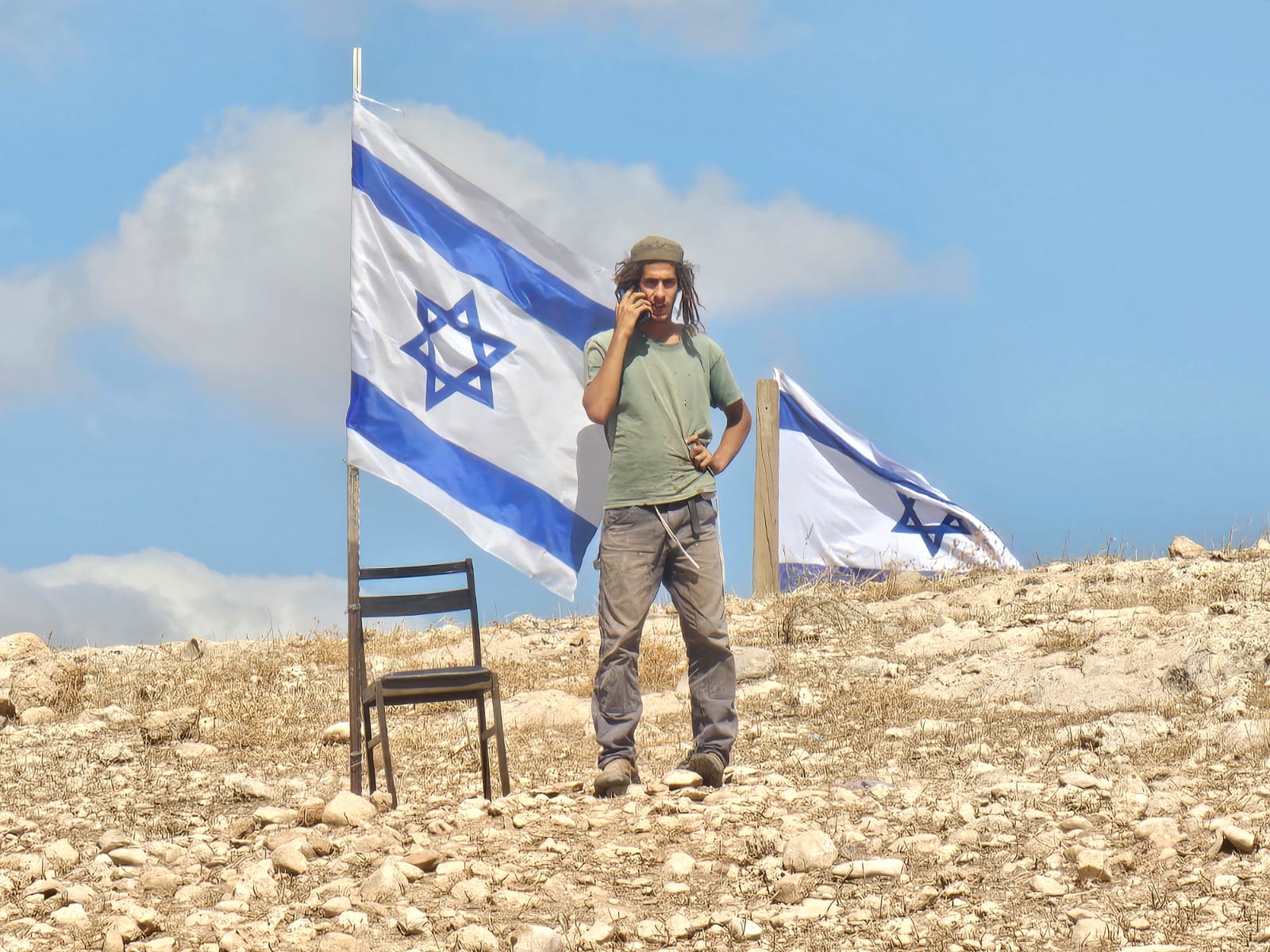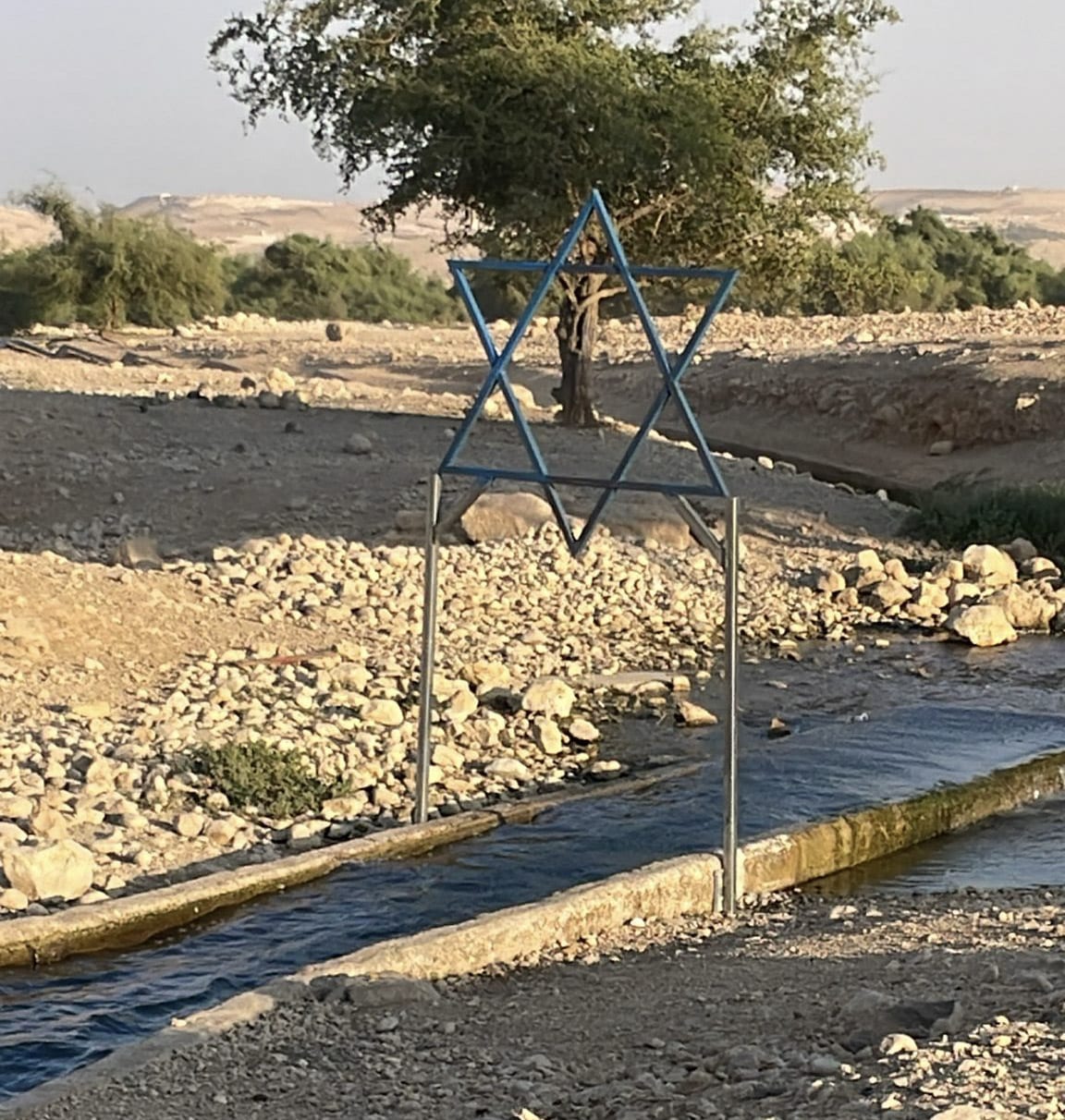We first visited Abu Ahmed* and his family on a sunny morning in early September. They live in the small herding community of Al Farisiya in the Jordan Valley. Where the track to their tents leaves the road there are two Israeli flags on poles, one on either side of the track. When we reach their tents, there are three more Israeli flags on poles on raised ground just above the family’s tents. The flags are fluttering in the warm breeze and are visible from almost everywhere in the camp. Together they appear to be designed to create a virtual boundary around the camp.
The Jordan Valley runs from the Dead Sea in the south to Bisan in the north, with the international border with Jordan to the east. Almost entirely lying below sea level, it is known for its rich agricultural production and warm climate. Sparsely populated, and with many open, undeveloped areas and mineral deposits, the Jordan Valley is the largest land reserve for future economic development of the West Bank.
The vast majority of the land in the Jordan Valley is in Area C, which remains under full Israeli military control. This poses a direct threat to the many Palestinian herding communities who have lived on this land for generations. Abu Ahmed welcomed us and noticed that we had been looking at the flags. He said;
‘The flags were put there by two Israeli settlers on quad bikes in early July. The settlers told us that we will be in trouble if the flags are removed or damaged. Settlers and the Israeli army drive into our camp every day, sometimes several times a day. I am frightened and have to treat the flags like I treat my own children.’

Settler and flags at Al Farisiya
We visited the family again a few days later and noticed that a chair had been placed alongside one of the flags on a small hill close to and overlooking the camp. Abu Ahmed said;
‘one of the settlers put the seat there a couple of days ago. He comes and sits, watching us, never saying a word even when we talk to him. Yesterday he brought his coffee and sat there watching us for an hour.‘
On our next visit Abu Ahmed’s son pointed out a bench which had been added alongside the seat.
‘The same settler brought the bench yesterday. He then came down into our camp. Without saying a word, he took metal pegs and wire from the fences of our animal pens to fasten the bench to the hill. He and another settler drive up there in their quad bikes and sit and watch us.‘

Star of David over Palestinian water source
This behaviour by Israeli settlers is not confined to Al Farisiya. We have repeatedly seen Israeli flags at the entrances to other herding communities in the northern Jordan Valley. We also saw a metal Star of David that had been erected over a key Palestinian agricultural water canal at Al ‘Auja in the southern Jordan Valley.
Around 65,000 Palestinians and about 11,000 Israeli settlers live in the Jordan Valley. The majority of Palestinians live in the city of Jericho and small agricultural villages, but nearly 9,000 live in herding communities in Area C. Herding communities typically have herds of sheep or cows that graze on open pastureland, as well as areas that they plant with wheat and barley. Most herding communities have traditionally migrated on a seasonal basis, between long established family camps.
Since the beginning of the Israeli occupation in 1967, successive Israeli governments have pursued various measures to appropriate this territory. In violation of international law, Palestinians are effectively prevented from developing their communities, their homes are systematically demolished, they are denied access to water, and their freedom of movement is severely restricted.
The first Israeli settlements in the Jordan Valley were built soon after the Six Day War in 1967 and there are now over 37 settlements, which are all illegal under international law. In addition, there are numerous settler outposts; dwellings established ‘unofficially’ by ideological settlers on Palestinian land. These are outside of even Israeli planning laws, but they receive military protection and financial assistance from the Israeli government and are connected to Israel’s main electricity and water supply, and access roads. Most are retroactively legalised by the Israeli governement.
Herding communities are particularly vulnerable to harassment from settlers because their presence hinders the further expansion of settlements in the Jordan Valley. Settler farms now control a vast area that Palestinian herding communities have been using as pastureland for decades, both before and after the occupation of the West Bank in 1967. Other parts were declared military firing zones or nature reserves by Israel between the late 1960s and 1980s, and with the proliferation of settler farms, the majority is now effectively completely closed to Palestinian herding communities, jeopardising their livelihoods.
Settler violence against Palestinians is well documented. The UN currently records around 100 incidents every month in the West Bank, initiated by settlers, that result in casualties and/or property damage. Although the flags, the seat, the bench and the accompanying threats to Abu Ahmed and his family are not physical violence, they are examples of harassment, trespass and intimidation, which the UN describe as increasing the pressure on Palestinians to leave their land.
Physicians for Human Rights Israel has reported how life beside settler outposts and farms entail daily exposure to oppressive and coercive mechanisms, systemic discrimination, and a continuous sense of insecurity and fear; in particular how constant exposure to such routine violence is detrimental to the health of Palestinians.
Israeli human rights organisation, B’Tselem has documented how settler violence forms part of a ‘two-track’ system, alongside Israeli government policies to forcibly displace Palestinians.
‘Israel has taken over some areas [of Palestinian land] using official means: issuing military orders, declaring the area ‘state land’ a ‘firing zone’ or a ‘nature reserve’… Other areas have been effectively taken over by settlers through daily acts of violence… Settler violence against Palestinians serves as a major informal tool at the hands of the state to take over more and more West Bank lands.’
Since the violence in Gaza began in October 2023, the pressure on Palestinian herding communities to leave their land and livelihoods has intensified, yet we are not powerless to create change. Please stand in solidarity with Palestinians facing forcible displacement. See our urgent actions below and share widely.
Take action!
-
Israel has passed a law, which will make it extremely difficult for the Palestinian refugee agency UNRWA to deliver its life-saving services at a time of immense need. Sign and share our urgent action to protect UNRWA. In the UK? Sign here. In Ireland? Sign here.
-
In July, the world’s highest court ruled that Israel’s occupation of all Palestinian territory was illegal and must end! It has called for the removal of all settlements from Palestinian land. Sign and share our urgent action on the ICJ’s Palestine ruling! In the UK? Sign here. In Ireland? Sign here.
-
Israel’s expanding military campaign is having catastrophic consequences for people in Palestine and Lebanon. Donate to the Disaster Emergency Committee (DEC) humanitarian appeal here. Can’t donate? Can you share with your friends and family?
What does international law say?

